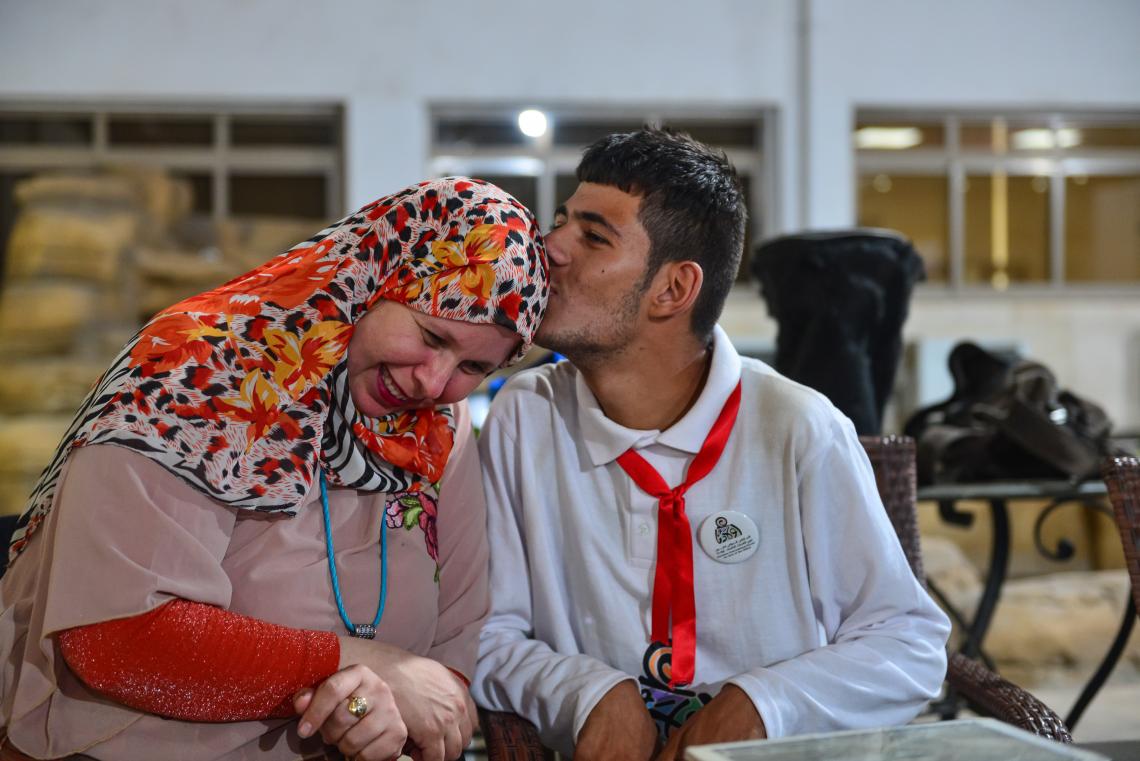
From long driving hours to different therapists, to developing individual learning plans, extra study sessions, and helping them in the tiniest tasks that can be performed independently, such as getting dressed – the life of a parent of an autistic child can be deemed as nothing short of overwhelming, even if also rewarding and heart-warming.
In light of autism month in April, we delve deeper into the familial life of those with autism.
Inside the house of an autistic child are not just separate individuals, but a family that lives as one individual. Wherever the child goes or does, the parents act as their shadow to help them navigate and go about their day-to-day life. Sometimes it can often feel like that parent is reliving their childhood all over again, or are selling their hearts to another independent soul. They aren’t just a parent, they are also the teacher, the coach, the friend, the manager and the advocate or ‘PR’ person for their child.
But amid all of this, where can they find their own source of support and right to better treatment and care?
Mai Al-Dahan, 43, is a freelance content writer and the founder of ‘Autism Diaries’; the latter is a platform she founded last year to create a parents’ network and support group for those living with autistic children.
After a long and successful career in the media industry, and reaching the reputable position of a content director, she had to abruptly quit her job as the demands of taking care of her son increased and engulfed her. Currently, the only job that could support her schedule is that of a freelance writer, which allowed her to have more flexibility to take care of him.
“I had to change my entire career because of him. And, when I tried to go back to a full-time job, it was very difficult because not all employers are understanding of the fact that I need the other half of the day to be with him,” she tells Egyptian Streets. “As mothers, sometimes we are discriminated against at the workplace because we have children with special needs. But, we also need financial support, and there are yet no laws or policies that can help parents with autistic children be covered by insurance.”
Children with autism often show behavioral problems, which may include atypical eye contact, hyperactivity, and repetitive body motions such as rocking or hand flapping.
There are many misconceptions about autism, mainly that it is a mental illness and that they cannot contribute anything valuable to society. However, there are many examples of people with autism who have experienced successes and made notable achievements. Essentially, the brain of an autistic child simply works differently, and they have a different way of being, such as how they communicate and interact with the world, expressing themselves openly and authentically in a way that is usually not accepted in society.
For instance, when an autistic child is stressed or overhyped, they can often have loud public meltdowns as they feel overwhelmed with emotions and sensory stimulations that are out of their control. Additionally, autism neurological differences will vary as to where the individual falls on the spectrum.
For many adults that have not been taught how to deal with autism, these behaviors have been identified as sometimes enabling mothers’ anxiety and depression, as the relationship between stress and behavior problems of children with autism lead to increases in parental stress. Studies have shown that factors that are associated with parental stress in “children with autism include feelings of loss of personal control, absence of spousal support, informal and professional support.”
In Egypt, autism only started to gain attention among the scientific community in the 1990s, which has created a delay in policy and legal responses as there was no comprehensive data on disabilities available. One of the most important researches is the “The Economics of Autism in Egypt” by Roger Lee Mendoza, which highlights that autism in Egypt can result in higher costs due to investments in time and attention by the family caregivers, and that making autism care more affordable should be a key health policy to avoid higher economic costs.
In 2021, Egypt’s government took an official step by announcing a five-point strategy to empower people with disabilities and involve them in all national projects and initiatives. During an event that celebrated the International Day of Persons with Disabilities, President Abdel Fattah El Sisi gave directives for the government to establish a fund to support disabled Egyptians, and for more specialized training to be provided for teachers working with children with special education needs.
However, there is still little attention paid to the families and parents of these children, with little avenues or networks for support. To combat this, ‘Autism Diaries’ helps parents navigate the struggles, as well as overcoming the grief and the anger that stems from society’s lack of awareness of autism and its challenges.
“I was surprised by the complete lack of awareness that exists in Egypt. I was struck by how much less awareness there is, and the amount of bullying that happens amongst children and even passive aggressive bullying amongst adults. It has been normalized in the language to refer tawahod (Arabic word for Autism) as though it’s a mental illness. But it isn’t a mental illness, it’s a development disorder and a lifelong condition,” Mai says.
“Through Autism Diaries, I wanted to create a parents’ network and support group, which can be a voice to reckon with in the future that will help change rules and laws that can enable my son live an independent adult life, and become more involved in society, such as understanding his needs and what kinds of jobs he can hold, and accepts him without judging his little intricacies that are different to what is socially acceptable.”
From sharing her own experiences, Mai hopes to encourage other parents to navigate the challenges more smoothly and also change their mindsets. Currently, ‘Autism Diaries’ helps parents take tips from each other and adopt certain strategies to deal with sensory issues, such as visual schedules, which can work very well to teach them how to make their own bed, make their own breakfast or take a shower by themselves.
Other than creating content online, she is currently planning to hold on- ground support events for parents. “I’m trying to find the right venues and create the right partnerships with psychologists, life coaches and sponsors that will actually take ‘Autism Diaries’ from a virtual medium to on-ground experiences where parents can network and support, and share ideas where we can help them overcome the challenges,” she says.
Before her son was diagnosed at the age of two, Mai initially found it difficult to get a diagnosis because he is what is often referred to as high-functioning, meaning that children exhibit no intellectual disability, but may exhibit deficits in communication, emotion recognition and expression, as well as social interaction. As a result, he did not have the most common signs of autism.
“There were no repetitive movements. There was a little bit of eye contact and so on, but he had some speech delay issues. It took a while to find the right psychologist who would diagnose him at the early age of two, because at the time they believed kids should not be diagnosed until they were about three or four years of age,” Mai shares.
Autism is highly variable, which is why the word ‘spectrum’ is used to refer to how autism is experienced differently by different people, and some might not be recognised or diagnosed until adulthood.
At the time, Mai’s family had already started therapy for their son, but the stress did not only come from discovering that their child is autistic, but also from the responsibilities that inevitably come with the diagnosis.
“There was a lot of pain, heartbreak, denial, disbelief, and confusion. And there was a day when I realized I can’t just feel sorry for myself. I have to educate myself about this. I have to educate my family about this, and I have to see what we’re going to do,” she says.
“I decided that I will be like his manager. I dealt with his therapists and saw how he progressed with each of them, and then we changed a number of therapists until we found the one he felt most comfortable with. I also spoke with the school, and created an individual learning plan. We adapted the curriculum to suit his learning needs, and I started educating my family and my friends on how to deal with him, how to talk to him, and now he’s much more comfortable with my sister picking him up from school if I’m too busy, so it’s definitely been a long journey.”
Fast forward to this day, Mai’s son is now getting ready to do his IGCSEs next year. He still requires learning support, and is still on an individual learning plan, but with the assistance of his family, he has been able to progress at his own pace in his education years.
Yet, support cannot merely exist inside the walls of his home. One of the main challenges that remain is societal acceptance, as Mai notes that he still struggles to make friends.
“Teenage years are all about acceptance and friends and the social community outside the home. But the most important thing that I’ve learned is that I have to continue to be his advocate, his PR person, and the person who brings the pieces of his life together until hopefully one day he will be able to do this without needing me,” she says.
As he continues this journey into adulthood, Mai is concerned about her own strength to continue giving him the support he needs.
“I need to take care of myself, my health and make sure that I’m strong enough so that I can continue this journey. This is why laws need to change to provide the right kind of support for parents, whether it is through insurance, emotional support, or understanding employers.”
“One day I will not be there and I want him to be able to survive in a world that does not put him through so much pain,” she says.






Comments (0)